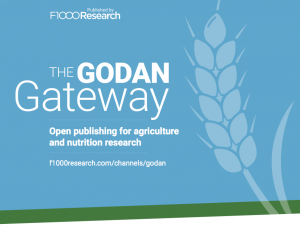Global agriculture & nutrition community launches open publishing initiative


Barcelona, April 5th 2017 — Global Open Data for Agriculture & Nutrition (GODAN) is pleased to announce the launch of its open publishing initiative for agriculture and nutrition research. The GODAN Gateway will run on the F1000Research platform.
_________________________________________________________________________________________________
The GODAN Gateway was announced during the 9th Research Data Alliance Plenary in Barcelona in the Joint Session of the Interest Group on Agricultural Data (IGAD).
GODAN is convinced that the solution to Zero Hunger lies within existing, but often unavailable, agriculture and nutrition data.
Launched in 2013 following a commitment by G8 countries to share agricultural data, GODAN collaborates with over 500 influential and committed partner organizations to spearhead the open data revolution in agriculture and nutrition.
F1000Research is an open science publishing platform that offers publication within a week of submission, followed by invited expert open peer review. This model enables research findings to be made available exceptionally quickly, especially important when this research can help address global issues as urgent as hunger, malnutrition and agricultural sustainability. Published articles, associated data and code, and peer reviews are all openly available for others to access and use.
The GODAN Gateway is open to contributions from across the research community. It publishes:
* Peer reviewed articles describing open data and informatics projects relevant to agriculture and nutrition, as well as methods and tools that enable, utilize and analyse such data.
* GODAN’s outputs including all policy documents, impact reports and discussion papers.
* Poster and slide presentations focused on open agriculture & nutrition.
Ben Schaap, Research Lead GODAN Secretariat, said: “In the age of data we are living we face common global challenges in agriculture and nutrition such as food security and environmental change. To address the global challenges, research findings and data need to be open and published timely and transparently. The GODAN Gateway on F1000Research is providing GODAN partners and the global community with an efficient publishing platform that will enhance data sharing for improved outcomes for agriculture and nutrition.” About GODAN GODAN is a global initiative supporting the proactive sharing of open data to make information about agriculture and nutrition available, accessible and usable to deal with the urgent challenge of ensuring world food security. The initiative focuses on building high-level support among governments, policymakers, international organizations and business. GODAN promotes collaboration to harness the growing volume of data generated by new technologies to solve long-standing problems and to benefit farmers and the health of consumers. |
Rebecca Lawrence, Managing Director, F1000, said: “GODAN’s aim to make vast quantities of agriculture and nutrition data easily accessible and usable to help society address some of the world’s most pressing issues is perfectly aligned with F1000Research’s open research values and practices. We look forward to working with GODAN on this exciting new project, which will enable a wealth of valuable research and data to be shared openly and, importantly, without delay, so as not to hinder the timely access to socially valuable findings.” About F1000Research F1000Research is an open research publishing platform for life scientists, from F1000, that offers immediate publication and transparent peer review, avoiding editorial bias and ensuring the inclusion of all source data. All articles must pass an initial in-house quality check and are then published in an open access format on F1000Research. Following open, invited peer review (where the referee’s name and affiliation and the referee reports are published alongside the article), authors can revise their article, which are then published as new article versions. Once articles are deemed to have passed peer review they are indexed in PubMed, Scopus, Embase and other databases. |

